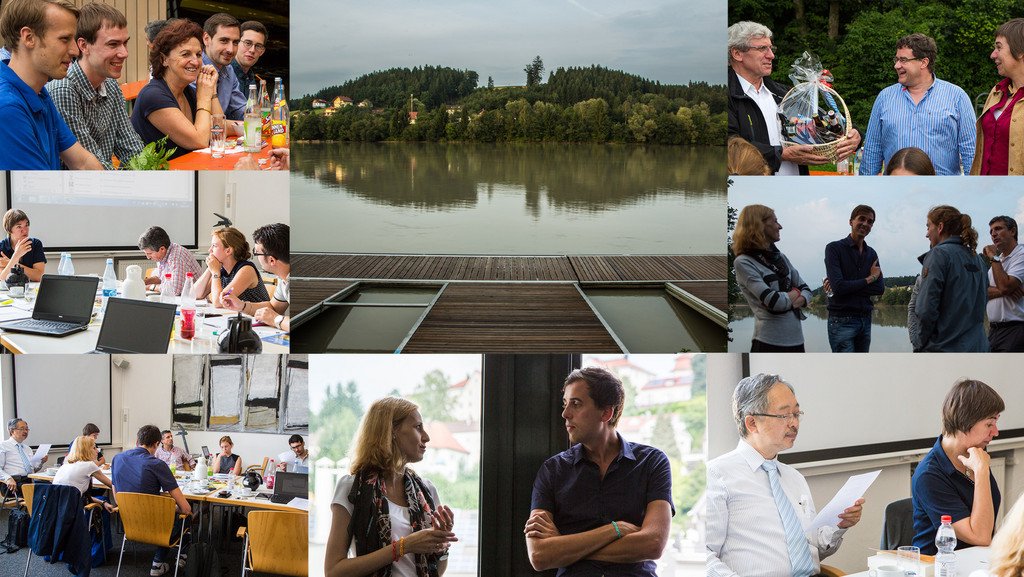
From the 4th to the 7th of august the ReConFort team has met again at the University of Passau. The participants from Belgium, Germany, Italy, Poland and Spain discussed the results already achieved and the future steps to take.
Each of the post-docs presented the results and the problems being found during the work in the past months. The following discussion under the direction of the principal investigator Prof. Dr. Müßig focused on solutions and new ideas for each country and the historical archival work.
On Monday, the research team was introduced to the president and the chancellor of the University of Passau, Prof. Dr. Burkhardt Freitag and Dr. Andrea Bör, to whom they presented the project.
The upcoming ReConFort database was the main topic on Tuesday. Stella Stars presented a first draft of the structure of database which then was discussed by the whole group. In the evening the ReConFort team and the team of the chair of Civil Law, German and European Legal History met for a barbecue at the shores of the river Inn and used the occasion the get to know each other. The meeting was also visited by padre Tangen who, together with the Marist fathers, has been supporting the research project from the first day on, accommodating the post-docs during their stays in Passau.
On the last day of the meeting the group was visited by Prof. Kittisak Prokati from the Thammasat University (Bangkok, Thailand) and was given a presentation by Marie-Charlotte Riehl on the concept of sovereignty during the period of the provisional government in France 1814.
An euphoric mood dominates after the end of the five day meeting in the conference room at the third floor of the Juridicum in Passau. There, the ReConFort project (Reconsidering Constitutional Formation, Constitutional Communication by Drafting, Practice and Interpretation in 18th and 19th Century Europe) officially started in March 2014 under the supervision of Prof. Ulrike Müßig. For five days, the scientists Katrin Brösicke (University of Passau), Brecht Deseure (Free University of Brussels), Guiseppe Mecca (University of Macerata), Antonio Sánchez-Aranda (University of Granada), Ania Tarnowska (Nicolaus-Copernicus University of Toruń), and the members of the advisory board (Prof. Dr. Ignacio Czeghun and Prof. Dr. Harald Kosch) had the opportunity to debate the first steps on the way to a new understanding of the European constitutional history. In the end, there shall be the answer to the question, how the constitutional discourse was generated in 18th and 19th century.
The visit of the cathedral site office at Passau, which lead the team at the top of the St. Stephan's cathedral of Passau, already indicated, that the scientists want to attain high results.
The debates of the kick-off meeting focused on the “communicative power” of a constitution.Given the filter-function of a constitution between politics and law the value-driven terms of constitutions cannot be considered fixed at any time. Their legal interpretation only succeeds in correspondence with the range of historical experience, which has been translated into constitutional language. There are always socio-historical circumstances, in which the protagonists use the historical consensus of the leading class for claiming a legal “first beginning”. Therefore, a better understanding of the interrelations between constitution and “discourse” is the core center of ReConFort.
At the end of the kick-off meeting the ReConFort team members agreed to start with a profound study and systematic analysis of constitutional documents in combination with reflective documents of acting political stakeholders and documents of a wider private and public constitutional “discourse”. The targeted approach will be three-staged: A. – Constitutions and materials (constitutional drafts or official stenographic records of constitutional debates) have to be assessed, collected, digitalised and finally edited including an English translation (of key sources). B. – Relevant cross-border private correspondences of protagonists upon constitutional affairs will be discovered (as mainly inedited or even unknown), collected, translated and analysed. C. – Publicist activities of major constitutional protagonists (including exile literature) and regional/national and cross-border constitutional journalism in public media.